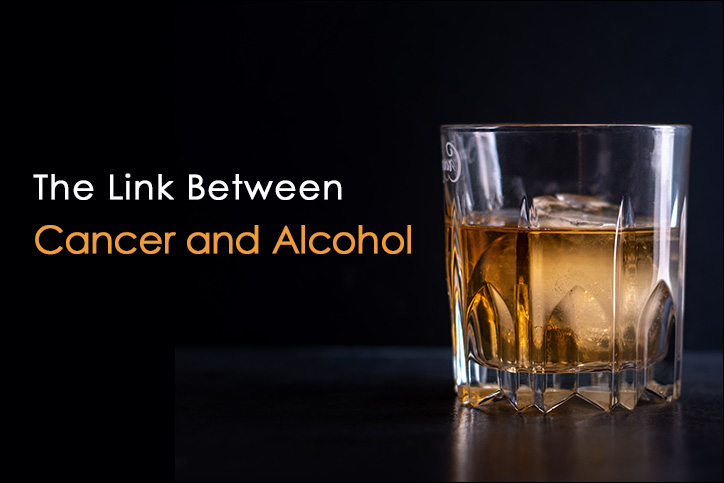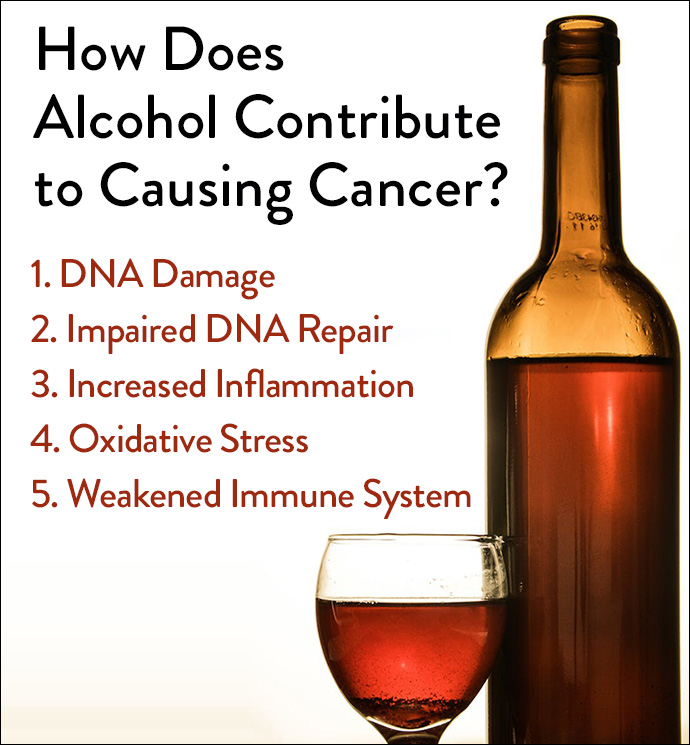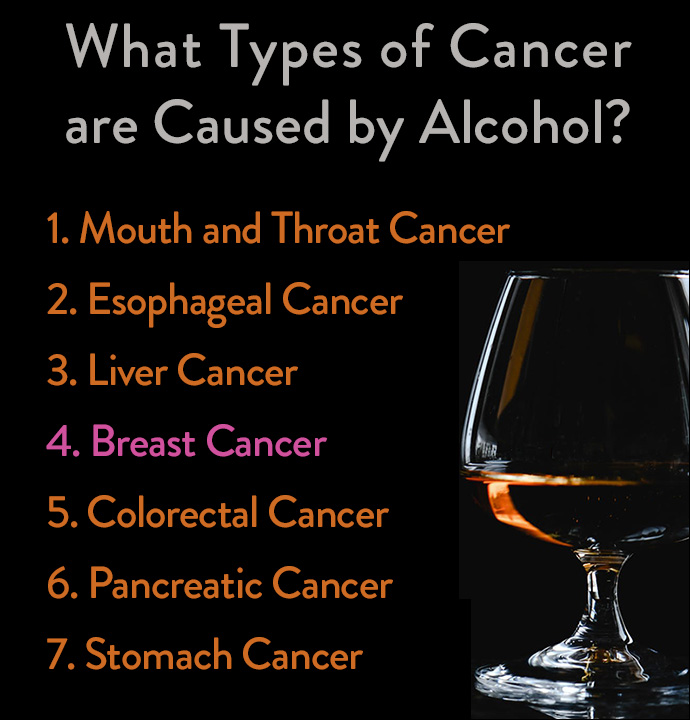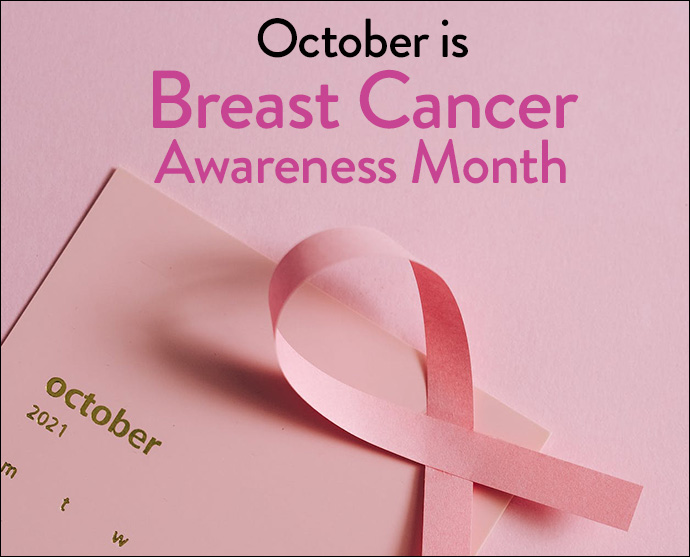Alcohol consumption is socially accepted and celebrated around the world. Even though it may be relatively safe in moderation, there is substantial evidence that shows a strong link between cancer and alcohol.
Most people rarely think about the negative issues of drinking alcohol beyond the occasional hangover or the possibility of being stopped for driving while intoxicated.
While moderate drinking may not pose a problem for many individuals, excessive or long-term consumption can lead to many negative side effects of alcohol like diabetes or heart and liver disease.
Unfortunately, the relationship between alcohol and cancer is much more significant than most people realize, and understanding the possible dangers can help people prevent it from happening.
October is Breast Cancer Awareness Month, so it’s an ideal time to examine the association between alcohol and breast cancer, as well as other forms of the disease.
Can Alcohol Cause Cancer?
Medical associations and healthcare groups worldwide all agree that alcohol is a contributing cause of cancer.
In fact, the World Health Association issued a statement saying, “no level of alcohol consumption is safe for our health.”
The International Agency for Research on Cancer listed alcohol as a Group 1 Carcinogen, alongside asbestos and tobacco.
Ethanol is the main carcinogenic compound found in alcoholic beverages, and its presence can lead to DNA damage and interfere with the body’s ability to repair itself.
Because alcohol is a carcinogen, heavy consumption increases the possibility for developing cancer, and the more a person drinks, the higher his or her risk becomes.
The body also converts alcohol into acetaldehyde, which can damage DNA and proteins and increase the risk of cancer.
In addition, alcohol consumption can disrupt hormones, particularly in women, which may boost the vulnerability of breast and ovarian cancer.
How Does Alcohol Cause Cancer?
Understanding the link between cancer and alcohol is crucial for comprehending the risk involved.
5 Ways Alcohol Contributes to Cancer Development
1. DNA Damage
When alcohol is metabolized in the body it produces harmful chemicals, including acetaldehyde, which can cause DNA damage and mutations. These DNA mutations are a critical factor in the development of many types of cancer.
2. Impaired DNA Repair
Alcohol consumption, especially heavy or chronic use, can impair the body’s natural ability to effectively repair damaged DNA caused by chemicals like acetaldehyde. This can lead to an accumulation of changes in the body associated with cancer.
3. Increased Inflammation
Chronic alcohol consumption increases inflammation in the body’s organs and tissues. Elevated inflammation can promote tumor growth and cancer development throughout the body.
4. Oxidative Stress
When alcohol is processed in the body it causes oxidative stress that may damage cells, proteins, and DNA. Oxidative stress facilitates the development of inflammation, infections, and diseases like diabetes and cancer.
5. Weakened Immune System
The effects of alcohol can weaken the immune system and reduce its ability to identify and eradicate cancerous cells if they begin to form. A compromised immune system may lead to the formation of tumors and uncontrolled cancerous cell growth.
What Types of Cancer are Caused by Alcohol?
Alcohol consumption is linked to a number of different types of cancer and the risk increases with the length of time a person has been drinking and the amount they regularly consume.
7 Common Types of Cancer Linked to Alcohol Include:
- Mouth and Throat Cancer
- Esophageal Cancer
- Liver Cancer
- Breast Cancer
- Colorectal Cancer
- Pancreatic Cancer
- Stomach Cancer
Alcohol consumption is a significant risk factor for mouth and throat cancer, including pharyngeal, and laryngeal cancers. People who are regular smokers and drinkers have an even higher risk of developing these types of cancers.
Liver Cancer and Alcohol
Chronic alcohol consumption can cause alcoholic liver disease and lead to liver cirrhosis symptoms, which significantly increases the risk of developing liver cancer.
The chance of developing liver disease, cirrhosis, and liver cancer is highest among heavy and lifelong drinkers with an addiction to alcohol.
Breast Cancer and Alcohol
There is a significant relationship between breast cancer and alcohol consumption, especially among women who are frequent or heavy drinkers.
All types of alcohol contribute to an increased cancer risk, and it doesn’t matter if a woman regularly drinks beer, wine, or distilled spirits like gin or vodka. Alcohol is a known carcinogen and exposure is associated with all types of alcoholic beverages.
Although the risk of breast cancer is particularly higher among heavy drinkers, even moderate alcohol use can be a contributing factor.
The dangers of breast cancer are heightened for women because drinking can raise the levels of estrogen and other hormones in the body, which are known to promote the growth of hormone-sensitive breast cancer.
Men are not immune to breast cancer, but estrogen and female hormones play a more significant role in developing the disease.
Genetic factors can have an impact on why some women are more susceptible to the effects of breast cancer and alcohol. If a woman had a mother or grandmother who was diagnosed with breast cancer, it could genetically increase her chances of also developing the disease.
The timing of when a woman started drinking or was drinking at the heaviest point may be a risk factor for developing breast cancer later in life.
Studies have suggested that alcohol consumption after a woman’s first menstrual period (menarche) but before her first pregnancy might play a role in the likelihood of breast cancer.
Of course, each person’s individual response to alcohol will vary. Some people may be more genetically susceptible to the effects of alcohol, while others will have a higher tolerance. Hormones and lifestyle issues should also be considered.
There is a lot of information that says moderate alcohol consumption may have certain health or cardiovascular benefits. While this may be true in certain instances, there is still an increased risk of developing breast cancer and other forms of the disease.
For anyone who has a family history of cancer or is predisposed because of other health issues, reducing alcohol consumption or abstaining from it completely will reduce the chances of developing the disease.
Giving up drinking can be challenging for those with an alcohol use disorder. Professional alcohol treatment centers offer the safest and most effective way to overcome dependence and addiction.
Alcohol and Cancer Awareness in October
As outlined here, the link between cancer and alcohol consumption is undeniable. Even though the relationship will be different for each individual, the fact remains that alcohol can indeed cause cancer.
Breast Cancer Awareness Month is observed every year in October. Its primary goal is to raise awareness about breast cancer, promote early detection, provide support for those affected by the disease, and raise funds for breast cancer research, prevention, diagnosis, and treatment.
Early detection of breast cancer can significantly improve treatment outcomes and funds raised during Breast Cancer Awareness Month support ongoing research to better understand the disease and develop new treatments for finding a cure.
The month of October is devoted specifically to breast cancer, but the information and resources available to the public also pertain to other types of cancer as well.
Raising awareness about cancer is paramount to a healthier society, and sharing insights about the risks of cancer and alcohol consumption is an important step toward prevention for everyone.







